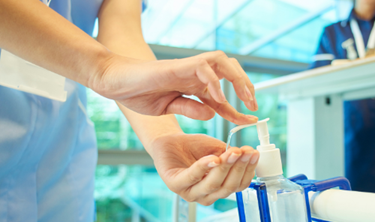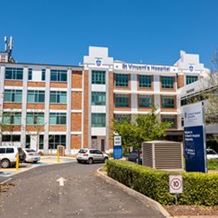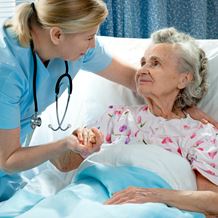Patient resources Patient Information & Safety- healthcare associated infections

- Home
- Our Hospitals
- St Vincent’s Private Hospital Toowoomba, QLD
- Patient Information
- Patient Information & Safety- Healthcare Associated Infections
What are healthcare associated infections?
Although health professionals try to give the best possible care sometimes things can go wrong and patients can get an infection.
Healthcare associated infections (HAI) are infections that occur as a result of healthcare interventions and are caused by micro-organisms such as bacteria and viruses. They can occur when you are being treated in hospital, at home, in a GP clinic, nursing home or any other healthcare facility.
How do they occur?
Some infections occur after an invasive procedure such as surgery and can be treated easily with antibiotics.
There are some infections such as Methicillin Resistant Staphylococcus Aureus (MRSA), Vancomycin
Resistant Enterococci (VRE) and diarrhoeal diseases such as Clostridium Difficile that are more difficult to treat because they are resistant to certain antibiotics.
The risk of getting an infection depends on how healthy you are, how long you have been in hospital, and the type of medication that you are taking.
During your admission you may be swabbed (with your consent) for MRSA and VRE if you have spent time in hospital or in a nursing home.
These specific infections require the use of special antibiotics and, at times, special precautions which may include placement in a single room and the use of personal protective equipment such as gloves and gowns.
Can they be prevented?
There are a number of things that can be done to prevent healthcare associated infections.
We have a range of procedures, policies and structures to reduce the risk of infection. You will see healthcare workers do the following things to prevent and control the spread of infection:
- washing hands with soap or using alcohol based hand rubs
- maintaining a clean environment
- wearing personal protective equipment such as gloves, gowns, masks and goggles
- isolating people who have an infective illness
- using sterilised equipment.
What can I do?
Everyone, including healthcare workers, patients and visitors, has a role in preventing and controlling healthcare associated infections.
There are a number of things you can do to reduce the risk of infection:
- the best way to prevent infections is to clean your hands carefully with soap and water or use an alcohol based hand rub
- do not be afraid to ask a healthcare worker if they have washed their hands
- cover your mouth and nose with a tissue when you cough or sneeze (or into your elbow if you don’t have a tissue) and clean your hands afterwards
- report any infections you have had previously, especially if you are still on antibiotics
- make sure you take the full course of antibiotics you are given, even if you are feeling better
- if you have a dressing or a wound, keep the skin around the dressing clean and dry; promptly let your nurse or doctor know if it becomes loose or wet
- tell your nurse or doctor if the drips, lines, tubes or drains inserted into your body or the area around them becomes red, swollen or painful
- follow instructions you are given on looking after wounds or medical devices you have; ask if you are not sure of what to do
- let your nurse or doctor know if your room or equipment hasn’t been cleaned properly
- stop smoking before any surgery, as smoking increases the risk of infection.
When should I clean my hands?
- Before touching or eating food.
- After you have gone to the bathroom/toilet.
- After sneezing, coughing or disposing of tissues.
- Before touching your eyes, nose or mouth.
- After handling dirty clothes or linen.
- Before and after touching a wound or its dressing.
If you a visitor or carer
- Do not visit someone in hospital if you feel unwell or have a cold, have been vomiting or had diarrhoea. Delay your visit until you are well.
- Clean your hands with alcohol hand rub or soap and water before visiting friends/relatives and before going home.
- Avoid bringing too many visitors at one time to visit someone; always check with hospital staff.
- Be careful not to touch dressings, drips or other equipment around the bed.
Where can I find more information?
Please speak to your care provider looking after you, and/or your family.
The infection prevention and control professional at St Vincent’s Private Hospital Toowoomba will be able to provide additional information.
Consumer guides are also available on specific healthcare associated infections such as Methicillin Resistant Staphylococcus Aureus (MRSA) and Vancomycin Resistant Enterococci (VRE) and Clostrifium Difficle from the National Health and Medical Research Council (NHMRC) and the Australian Commission on Safety and Quality in Health Care (ACSQHC) websites.
Related Content

Patient Information & Safety- Admission Information
Information about patient admission at St Vincent's Private Hospital Toowoomba.
Read More
Patient Information & Safety- Falls prevention
Information for patients about falls prevention.
Read More
Patient Information & Safety- Pressure Injuries
Patient and carer information about pressure injuries.
Read More
